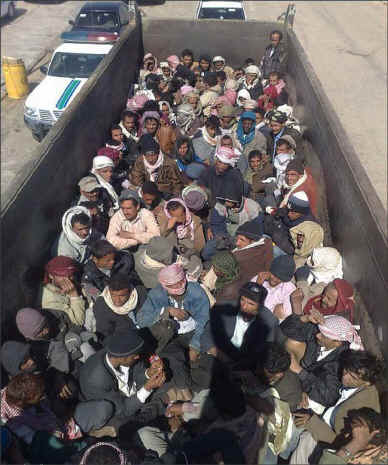
Photograph published by the Yemen Times, said to show Yemenis rounded up for deportation from Saudi Arabia
Amid growing controversy over the mass expulsion of foreign workers from Saudi Arabia, Arab News reports that the governor of Riyadh, Prince Khaled bin Bandar, has extended the "Saudisation" deadline for businesses by two months. The paper says Prince Khaled's move has been welcomed by "Saudis and expatriates alike", and the governors of other regions are likely to follow suit.
However, there are signs of disagreement among different branches of offialdom. Arab News also notes that a spokesman for the Labour Ministry – which is at the forefront of the campaign to expel "illegal" foreigners – claimed to be unaware of the prince's decision, except through media reports.
The "Saudisation" programme is meant to reduced unemployment – especially among young people – by compelling businesses to employ more Saudi citizens but Arab News says "the nationwide campaign has hit businesses and created a kind of fear among expatriates".
This has led to the targeting and deportation of thousands of foreigners deemed to be working in the kingdom illegally (largely as a result of corruption in the process of granting permits). Almost 800,000 have been expelled during the last 15 months, according to Saudi officials.
Some are questioning the deportation policy, and businessman Rafeek Younus argued that the Labour Ministry should instead be helping expatriate workers to regularise their status. He told Arab News:
"Many foreigners have come to the kingdom purchasing visas offered by Saudi sponsors, paying thousands of riyals. They would not have purchased such visas if they knew they would be considered illegals."
Another problem with the policy is that Saudis – even if they are unemployed – are unlikely to take up the menial kind of jobs being vacated by many of the expelled foreigners. Building workers are one example and, as a columnist in al-Yaum newspaper pointed out, "Thousands of Saudis are in the process of building their own houses and they depend mainly on foreigners."
Here is a round-up of other news reports:
Schools closed
A number of private schools in Riyadh and Jeddah have been closed this week, the BBC reports. Expatriate teachers who believe they fall foul of changes in the Saudi labour law are staying away from work:
"With most of the teachers coming from abroad, the schools have found themselves without staff as employees remain at home in order to evade the net of arrests and deportations. Many small businesses have also reportedly been staying shut for the same reason."
The BBC adds that there have been protests outside the Saudi embassy in Yemen (one of the countries most affected by the expulsions).
Filipinos arrested
Some 30 Filipinos were arrested in Jeddah this week during the crackdown on illegal workers and employers, according to the Philippines Department of Foreign Affairs.
The Asia Pacific Mission for Migrants called on the Saudi government to halt its crackdown and instead "address why migrant workers become undocumented".
Indians panic
The Times of India reports panic among the Indian communities in various Saudi cities:
"Many people are refusing to step out of their homes as coordinated raids are being conducted on the streets and at offices. Local newspapers have reported that many community schools run by Indians have also been shut for a few days on account of the raids," said Faiyaz Sharief, a hospital employee who lives in Jeddah but hails from the city.
Images and videos of the raids floating on the internet, which show migrants in deplorable conditions trying to evade the authorities, have also fuelled the panic.
The paper also says 2,000 Indians have approached their embassy in Riyadh during a two-day period this week, seeking Emergency Certificates to return to their homeland.
The Economic Times quotes Vayalar Ravi, the Overseas Indian Affairs Minister, as saying: "We have decided to provide air tickets to deserving people who want to come back from the country. I have asked the ambassador to extend all possible help to our citizens affected by the law."
Scenes of brutality
The Lebanese al-Akhbar says a video showing a group of Saudi civilians beating allegedly undocumented immigrants has been circulated widely online. It continues:
"The footage shows at least five non-Saudi men lying on the ground with their hands tied behind their backs, surrounded by a dozen men wearing the traditional thobe. One of the foreigners says he is innocent, to which one Saudi replies 'If you had come legally, no one would have tied you up like this.'
"Several men then start kicking one of the immigrants, despite pleas by several people, including the person filming the scene, to stop. A person wearing camouflage fatigues – presumably a member of Saudi security forces – appears towards the end of the video, seemingly trying to disperse the crowd assaulting the immigrant."
Al-Akhbar provides a link to the video, though attempts to access it this morning resulted in a message saying "This video is private".
Posted by Brian Whitaker
Friday 5 April 2013

 RSS Feed
RSS Feed
